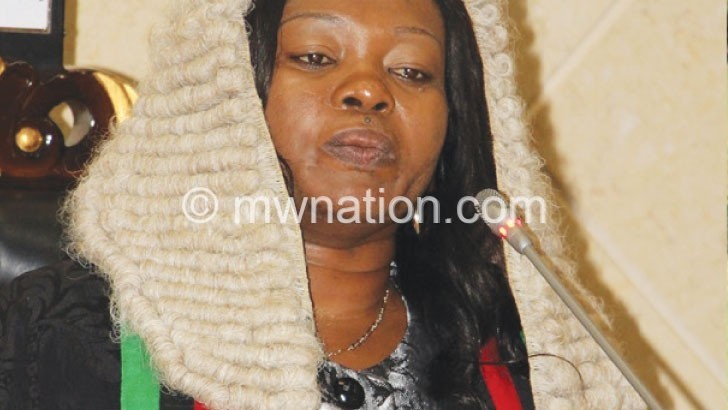Concourt Back in game
The battle for the soul of Malawi’s democracy returns to the Constitutional Court (ConCourt) where Speaker of Parliament Catherine Gotani Hara has referred President Peter Mutharika’s decisions to withhold assent to four election-related bills and not to fire Malawi Electoral Commission (MEC) commissioners.
The Speaker’s move coincides with the action that Malawi Congress Party (MCP) and alliance partner UTM Party have take to ask the ConCourt to declare whether the commissioners’ continued tenure at MEC is legal or not.

The commissioners—led by Justice Jane Ansah—are running the show at MEC despite the court declaring them incompetent to manage an election and Parliament’s Public Appointments Committee recommending their dismissal.
The commission has since released an electoral calendar that puts July 2 2020 as the date for fresh presidential elections that the ConCourt ordered should be held within 150 days of its ruling that nullified Mutharika’s reelection.
In a statement announcing her communication to the ConCourt, Gotani Hara said: “The National Assembly is proceeding to communicate the decisions of the President to the Constitutional Court through the office of the Registrar of the High Court and the Supreme Court of Appeal.
“Members of the public are hereby assured that the National Assembly will continue to abide by any court rulings as one way of ensuring that there is respect for separation of powers and the rule of law.”
But law experts The Nation talked to yesterday said the Speaker has received bad legal advice.
In an interview, lawyer Justin Dzonzi said the approach the Speaker has taken to write the ConCourt is flawed.
“My view would be, in Malawi, when one is dealing with the court, the way you engage it is through commencement of legal processes, and not administrative processes, which the Speaker has taken.
“The best was for the Speaker to instruct her lawyers and raise whatever issues they may have or may have settled for by way of legal dispute. But by writing the Registrar [of the Judiciary], she has opted for administrative process, which the court cannot act upon,” he said.
Dzonzi said the ConCourt instructed Parliament to act on certain issues that included tabling and passing of some electoral bills within 21 days and the President, guided by the Constitution, also had 21 days to assent to the bills.
He said when the President refused to assent to the bills, the Speaker had a chance to summon the National Assembly to retable them and address the glaring areas the President raised.
“And if the bills were to be resubmitted to the President, he would have no option, as per dictates of the law, but to assent to them. This process has not been exhausted,” Dzonzi said, adding the Registrar cannot instruct the President to assent to the bills.
Another legal expert John-Gift Mwakhwawa concurred with Dzonzi in a separate interview, arguing courts are not moved by letters.
“Courts are never moved by letters, but summons. When the Constitutional Court made its judgement on February 3, it did not require parties to return to it to complain on noncompliance issues.
“There are set procedures in place as to how one may approach the courts if aggrieved, and this includes commencement of contempt of court if a party fails to comply with a judgement,” he said.
A law professor at Chancellor College Garton Kamchedzera is also on record to have said parties to the case were free to return to court and launch a legal process to the effect that one of the parties to the case, President Mutharika in this case, was frustrating implementation of issues the court ordered them to undertake and ensure the fresh presidential election is conducted within 150 days.
Meanwhile, Parliamentary Legal Affairs Committee has trashed the calendar that MEC produced, saying the commissioners are doing that against the court’s ruling as the calendar does not provide for 50%+1 as the winning margin and run-offs as ruled by the ConCourt.
Legal Affairs Committee chairperson Kezzie Msukwa said there is need for MEC to obey the court order, saying when Parliament meets, his committee may consider re-tabling the bills so that they can follow the court’s ruling.
The President received for his assent the following bills from the Speaker on February 25 2020: Electoral Commission (Amendment) Bill; Electoral Commission (Amendment) (No.2) Bill, Parliamentary and Presidential Elections (Amendment) Bill and Parliamentary and Presidential Elections (Amendment) (No.2) Bill.





